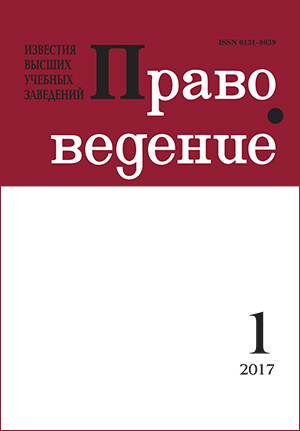Discourse analysis in the study of the individual legal consciousness
Abstract
The article presents an experience of the discourse analysis as a method of phenomenological and linguistic interpretation of the legal discourse. Its text form constitutes objectified phenomena of the individual legal consciousness. Systematic research is achieved by resolving interrelated issues consecutively. In particular, the article presents a justification of theoretical and methodological features and a comparative analysis of the basic development areas of the discourse analysis and reveals the complexity of studying the individual legal consciousness. The paper shows that intentions of the individual legal consciousness determine the discourse content and form, the positions of its participants. They transform the old meanings of law and generate the new ones which, in their turn, create a common understanding of legal realities and form the space of social practices. The author argues that the linguistic version of the discourse analysis is the most effective method of studying the individual legal consciousness, and the phenomenological approach enables to identify it as an essential characteristic of a legal actor implemented as a process of constitution and updating the meanings of legal judgments. The article compares the legal and ordinary legal discourses, thus identifying their common subjectified components, namely attitudes, identity and competence. In addition, the same components are used as parameters of the discourse analysis. The paper shows how these components provide the coordination between the discourse components namely a text, speech acts, consciousness of a speaker and a listener, as well as facilitate the study of the individual legal consciousness phenomena. The outcomes of the presented experience of the discourse analysis prove the prospect of using its typical methods of phenomenological and linguistic interpretation in the study of legal discourses, and in the study of manifestations of positivity (loyalty) and deformation of individual legal consciousness.
Keywords:
discourse analysis, discourse, individual legal consciousness, phenomenology, constitution, deformation, attitude, identity, semiotic and narrative competence, discourse competence
Downloads
References
Downloads
Published
How to Cite
Issue
Section
License
Articles of "Pravovedenie" are open access distributed under the terms of the License Agreement with Saint Petersburg State University, which permits to the authors unrestricted distribution and self-archiving free of charge.




